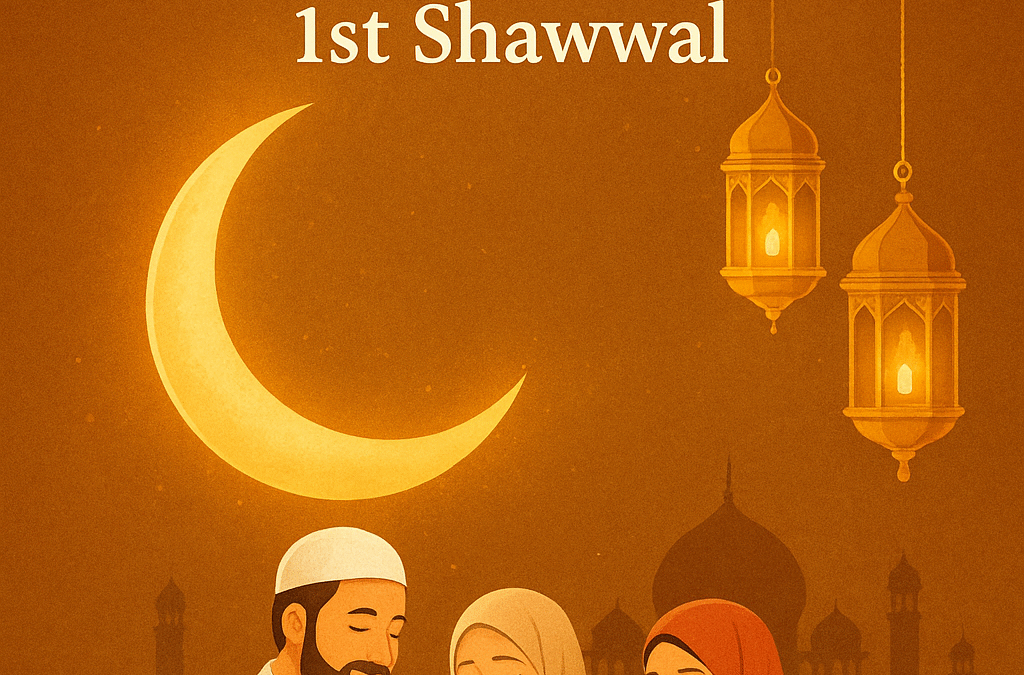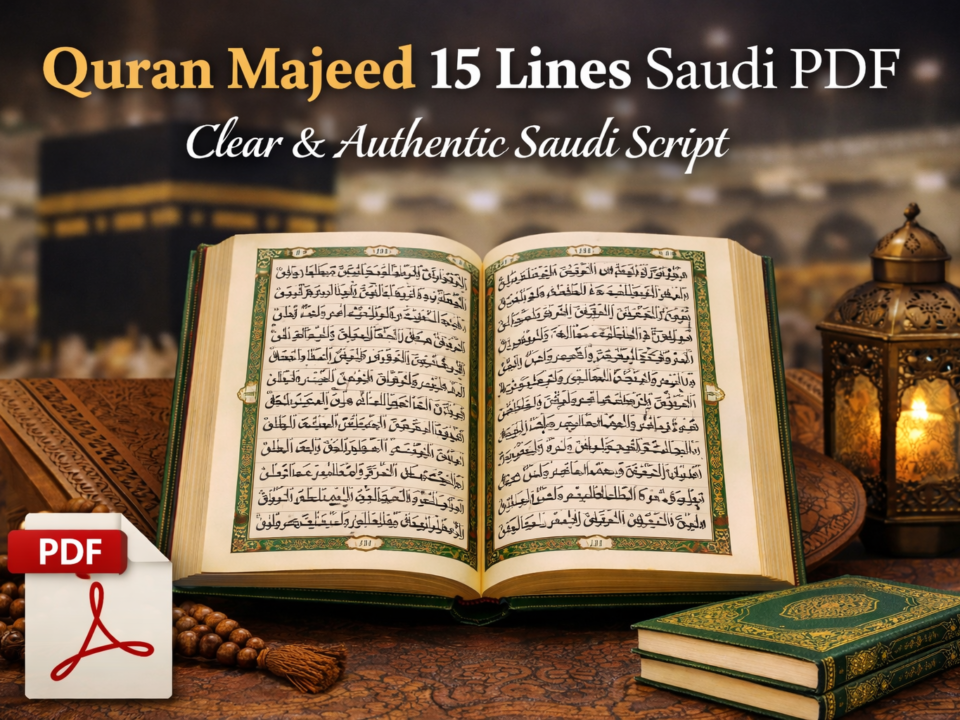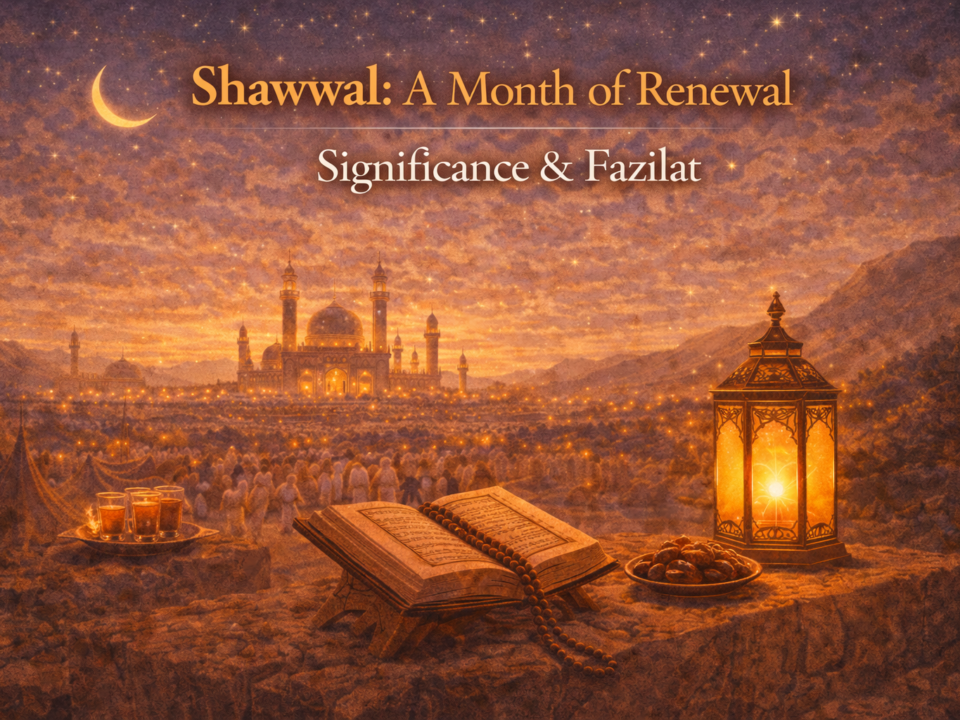Celebrating Unity and Gratitude: Eid al-Fitr on the 1st of Shawwal
Introduction
Eid al-Fitr, often referred to as the “Feast of Fast-Breaking,” stands as one of the most meaningful and festive events in the Islamic calendar. It falls on the 1st of Shawwal, immediately after the holy month of Ramadan. Eid al-Fitr is a period when Muslims gather in the company of their loved ones and close friends.express gratitude to Allah, and celebrate the spiritual growth and self-discipline achieved during Ramadan. In this blog post, we will explore the historical and cultural significance of Eid al-Fitr, the traditions associated with it, and the enduring lessons it imparts.The Historical and Spiritual Significance
End of Ramadan: Eid al-Fitr marks the conclusion of Ramadan, a month of fasting, prayer, and self-reflection. Muslims fast from dawn to sunset during this sacred month, refraining from food, drink, and other physical needs.Spiritual Renewal: Ramadan is a time of spiritual rejuvenation and heightened devotion. It provides an opportunity for Muslims to strengthen their relationship with Allah, seek forgiveness for their sins, and grow in empathy and compassion for those less fortunate.Gratitude: Eid al-Fitr is a celebration of gratitude to Allah for the strength and endurance shown during Ramadan. It is a reminder that fasting is not only a physical act but a spiritual one, cultivating self-discipline and self-control.Eid al-Fitr Traditions
- Eid al-Fitr is celebrated with a variety of customs and traditions that vary by culture and region. Some common practices include:
- Salat al-Eid: Muslims gather at mosques or open prayer grounds to perform a special prayer called Salat al-Eid. This prayer is usually held in the morning and is followed by a sermon.
- Zakat al-Fitr: Before the Eid prayer, Muslims are required to give a charitable donation known as Zakat al-Fitr, which is intended to purify those who fast from any indecent act or speech and to help the needy.
- Eid Greetings: Friends and family exchange greetings and well-wishes, such as “Eid Mubarak” (Blessed Eid) or “Eid Sa’id” (Happy Eid).
- New Clothes: Many Muslims buy new clothes for themselves and their families to wear on Eid day. This tradition symbolizes a fresh start and the joy of the occasion.
- Special Meals: Families prepare special meals for Eid, often featuring traditional dishes. It is common to share these meals with neighbors, friends, and those in need.
- Visiting Relatives: Eid is a time for family reunions. People visit the homes of relatives, exchange gifts, and spend quality time together.
- Eid Decorations: Some families decorate their homes with lights, banners, and colorful ornaments to create a festive atmosphere.
Enduring Lessons from Eid al-Fitr
- Eid al-Fitr imparts several important lessons to Muslims and humanity as a whole:
- Gratitude: The celebration of Eid reminds us to be thankful for the blessings we have and to express gratitude to Allah for His mercy and provision.
- Empathy and Charity: The practice of Zakat al-Fitr encourages generosity and charity, fostering empathy for those less fortunate and reinforcing the principle of helping those in need.
- Unity and Community: Eid brings communities and families together, reinforcing the importance of unity and social bonds in Islam.
- Self-Discipline: Ramadan teaches Muslims the value of self-discipline and control over one’s desires, which are essential qualities in leading a virtuous life.
- Spiritual Growth: Eid serves as a reminder of the spiritual growth achieved during Ramadan and encourages Muslims to continue their spiritual journey throughout the year.
Conclusion
Eid al-Fitr is a time of joy, unity, and reflection for Muslims worldwide. It encapsulates the essence of Ramadan’s spiritual journey and provides an opportunity to celebrate the rewards of self-discipline, prayer, and charity. As Muslims come together with family and friends to mark this special occasion, they express gratitude for the blessings in their lives and extend a helping hand to those in need. Eid al-Fitr is not only a celebration of faith but also a reminder of the values and principles that underpin the Islamic way of life. It is a testament to the enduring strength of the Muslim community and the profound spiritual connection that unites believers around the world.عنوان: اتحاد اور شکرگزاری کا جشن: عید الفطر یکم شوال کو
تعارف
عید الفطر، جسے اکثر “روزہ توڑنے کی عید” کہا جاتا ہے، اسلامی کیلنڈر میں سب سے زیادہ معنی خیز اور تہوار کے واقعات میں سے ایک ہے۔ یہ رمضان کے مقدس مہینے کے فوراً بعد یکم شوال کو آتا ہے۔ عید الفطر ایک ایسا دور ہے جب مسلمان اپنے پیاروں اور قریبی دوستوں کی صحبت میں جمع ہوتے ہیں۔
اللہ کا شکر ادا کریں، اور رمضان کے دوران حاصل ہونے والی روحانی نشوونما اور خود نظم و ضبط کا جشن منائیں۔ اس بلاگ پوسٹ میں، ہم عید الفطر کی تاریخی اور ثقافتی اہمیت، اس سے جڑی روایات اور اس سے ملنے والے لازوال اسباق کا جائزہ لیں گے۔
تاریخی اور روحانی اہمیت
رمضان کا اختتام: عید الفطر رمضان المبارک کے اختتام کی نشان دہی کرتی ہے، روزے، نماز، اور خود عکاسی کا مہینہ۔ مسلمان اس مقدس مہینے میں فجر سے غروب آفتاب تک روزہ رکھتے ہیں، کھانے پینے اور دیگر جسمانی ضروریات سے پرہیز کرتے ہیں۔
روحانی تجدید: رمضان روحانی تجدید اور بلند تر عقیدت کا وقت ہے۔ یہ مسلمانوں کو ایک موقع فراہم کرتا ہے کہ وہ اللہ کے ساتھ اپنے تعلق کو مضبوط کریں، اپنے گناہوں کی معافی مانگیں، اور کم نصیبوں کے لیے ہمدردی اور ہمدردی میں بڑھیں۔
شکر گزاری: عید الفطر رمضان کے دوران دکھائی جانے والی طاقت اور برداشت کے لیے اللہ کا شکر ادا کرنے کا جشن ہے۔ یہ ایک یاد دہانی ہے کہ روزہ نہ صرف ایک جسمانی عمل ہے بلکہ ایک روحانی عمل ہے، جس میں خود نظم و ضبط اور خود پر قابو پایا جاتا ہے۔
عید الفطر کی روایات
عید الفطر مختلف رسومات اور روایات کے ساتھ منائی جاتی ہے جو ثقافت اور علاقے کے لحاظ سے مختلف ہوتی ہیں۔ کچھ عام طریقوں میں شامل ہیں:
نماز عید: مسلمان مساجد میں جمع ہوتے ہیں یا نماز کے میدانوں میں نماز ادا کرنے کے لیے جمع ہوتے ہیں جسے صلاۃ العید کہتے ہیں۔ یہ دعا عام طور پر صبح ہوتی ہے اور اس کے بعد خطبہ دیا جاتا ہے۔
زکوٰۃ الفطر: عید کی نماز سے پہلے، مسلمانوں کو صدقہ فطر دینے کی ضرورت ہوتی ہے جسے زکوٰۃ الفطر کہا جاتا ہے، جس کا مقصد روزہ داروں کو کسی بھی بے حیائی یا تقریر سے پاک کرنا اور ضرورت مندوں کی مدد کرنا ہے۔
عید کی مبارکباد: دوست احباب اور اہل خانہ مبارکباد اور نیک خواہشات کا تبادلہ کرتے ہیں، جیسے کہ “عید مبارک” (مبارک عید) یا “عید سعید” (عید مبارک)۔
نئے کپڑے: بہت سے مسلمان عید کے دن اپنے اور اپنے اہل خانہ کے لیے نئے کپڑے خریدتے ہیں۔ یہ روایت ایک نئے آغاز اور موقع کی خوشی کی علامت ہے۔
خصوصی کھانا: اہل خانہ عید کے لیے خصوصی کھانے تیار کرتے ہیں، جن میں اکثر روایتی پکوان ہوتے ہیں۔ ان کھانوں کو پڑوسیوں، دوستوں اور ضرورت مندوں کے ساتھ بانٹنا عام ہے۔
رشتہ داروں سے ملاقات: عید خاندان کے دوبارہ ملاپ کا وقت ہے۔ لوگ رشتہ داروں کے گھر جاتے ہیں، تحائف کا تبادلہ کرتے ہیں اور ایک ساتھ معیاری وقت گزارتے ہیں۔
عید کی سجاوٹ: کچھ خاندان اپنے گھروں کو روشنیوں، بینرز اور رنگ برنگے زیورات سے سجاتے ہیں تاکہ تہوار کا ماحول بنایا جا سکے۔
عید الفطر سے پائیدار سبق
عید الفطر مسلمانوں اور پوری انسانیت کو کئی اہم اسباق دیتی ہے:
شکر گزاری: عید کا جشن ہمیں یاد دلاتا ہے کہ ہمارے پاس موجود نعمتوں کا شکر ادا کریں اور اللہ کی رحمت اور رزق کے لیے اس کا شکر ادا کریں۔
ہمدردی اور خیرات: زکوٰۃ الفطر کا عمل سخاوت اور خیرات کی حوصلہ افزائی کرتا ہے، کم نصیبوں کے لیے ہمدردی کو فروغ دیتا ہے اور ضرورت مندوں کی مدد کرنے کے اصول کو تقویت دیتا ہے۔
اتحاد اور برادری: عید برادریوں اور خاندانوں کو اکٹھا کرتی ہے، اسلام میں اتحاد اور سماجی بندھنوں کی اہمیت کو تقویت دیتی ہے۔
خود نظم و ضبط: رمضان مسلمانوں کو ضبط نفس اور اپنی خواہشات پر قابو پانے کی قدر سکھاتا ہے، جو ایک نیک زندگی گزارنے کے لیے ضروری خصوصیات ہیں۔
روحانی ترقی: عید رمضان کے دوران حاصل ہونے والی روحانی ترقی کی یاد دہانی کے طور پر کام کرتی ہے اور مسلمانوں کو سال بھر اپنا روحانی سفر جاری رکھنے کی ترغیب دیتی ہے۔
نتیجہ
عید الفطر دنیا بھر کے مسلمانوں کے لیے خوشی، اتحاد اور عکاسی کا وقت ہے۔ یہ رمضان کے روحانی سفر کے جوہر کو سمیٹتا ہے اور خود نظم و ضبط، دعا اور خیرات کے انعامات کو منانے کا موقع فراہم کرتا ہے۔ چونکہ مسلمان اس خاص موقع کو منانے کے لیے کنبہ اور دوستوں کے ساتھ اکٹھے ہوتے ہیں، وہ اپنی زندگی میں برکات کے لیے شکریہ ادا کرتے ہیں اور ضرورت مندوں کے لیے مدد کا ہاتھ بڑھاتے ہیں۔ عیدالفطر نہ صرف ایمان کا جشن ہے بلکہ ان اقدار اور اصولوں کی یاد دہانی بھی ہے جو اسلامی طرز زندگی کی بنیاد رکھتے ہیں۔ یہ مسلم کمیونٹی کی پائیدار طاقت اور گہرے روحانی تعلق کا ثبوت ہے جو پوری دنیا کے مومنین کو متحد کرتا ہے۔



